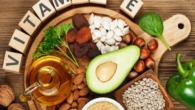
6 nutritional rules for those who are under severe stress
0
Horrible things happen . Upheavals for days or months not only deprive us of sleep, appetite and sense of humor – they slowly but surely take away our health. Therefore, the only thing that is important to do in the face of stress is to help your body survive it without devastating consequences.
All the negative changes that the human body experiences during prolonged stress are associated with increased cortisol production. In ordinary life, this hormone helps a person easily wake up in the morning, train and perform heavy physical work, deftly run away from bears or robbers. But if the period of emotional stress is prolonged, the adrenal glands literally flood the body with cortisol and most of the usual processes go differently or slow down:
- excess cortisol suppresses the human immune system, which threatens a higher risk of infectious diseases;
- suffers the human digestive system – cortisol slows down its functions;
- the risk of cardiovascular diseases seriously increases (stroke, heart attack, tachycardia, blood pressure spikes, thrombosis);
- long-term stress increases the risk of inflammatory diseases;
- high cortisol level for a long time associated with muscle breakdown and visceral fat accumulation.
One of the most effective ways to reduce cortisol levels and the risk of developing dangerous diseases is to engage in physical activity.
Any will do: walking, cycling, yoga, running, dancing and even just working around the house or in the garden. But diet is just as important as movement. To help the body survive stress and get out of the storm with the least damage to health, experts recommend rebuilding nutrition taking into account new realities. Here's what you can do.
1. Be kind to yourself
A stressful period is not the best time to berate yourself for an extra calorie, another glass of wine or pizza at one o'clock in the morning. Dealing with all your attitudes about food and making your relationship with it healthier can come later. In the acute phase of stress, the main thing is not to forget to eat regularly and try to be careful with your feelings and desires.
A ban on pies will definitely not improve your emotional state, but the desire to bake pies according to your grandmother's recipe can be a good reason to keep your hands busy and enjoy yourself. The need for so-called comfort food increases sharply against the background of emotional upheavals, because it reminds us of carefree childhood days, happy episodes of life. So cinnamon buns, a plate of hearty soup and a generous portion of spaghetti with cheese are unequivocal and without any reservations or self-punishments.
2. Vegetables and greens are unlimited
A high level of cortisol in the blood has a noticeable side effect: many important nutrients are heavily consumed and washed out of the body. First of all, reserves of magnesium, potassium, vitamin B1 (thiamine), which are designed to maintain a healthy state of the nervous system, metabolic processes, and normal synthesis of hormones, are depleted. Therefore, in a period of stress, it is important to provide yourself with food rich in vitamins and antioxidants.
The more diverse the set of plants on your plate, the more nutrients the stressed body will receive. Especially hot experts recommend greens, nuts and legumes, avocados – these products also contain a lot of fiber, which helps improve digestion. It is important to remember that during the period of nervous exhaustion, a person may need more plant food than the WHO recommended 400 g of fruits and vegetables per day.
3. Eat more protein
During prolonged stress, the body feels an increased need for protein. If in normal life an adult needs 0.8–1.1 g of protein per kilogram of body weight, during periods of emotional stress, the amount of meat, beans, nuts and dairy products in the diet can be increased by 10–20%.
For people who suffer from a lack of appetite, protein shakes enriched with vitamins can be a good solution. If there are no problems with appetite, our favorite is eggs. It is difficult to find another product that can boast the same high content of nutrients in such a digestible and compact form.
4. Don't skimp on quality food
It is clear that the new economic reality will force millions of people around the world to reconsider their eating habits. However, it is important to remember that human health depends on the quality of food, and this is the last thing that should be saved. Well-functioning foods that can be very useful in the face of high stress levels are not overseas delicacies at all.
Look for seasonal and frozen vegetables and fruits – they have the highest nutritional content and are usually cheaper . Look to offal, such as liver, which is one of the most valuable sources of B vitamins, which are essential for fighting stress. And in any case, try to eat as varied and high-quality food as you can afford. This is the most reliable investment.
5. Eat healthy fats
Olive and other types of vegetable oil, avocados, nuts, fatty fish – this is all a list of foods that will help reduce the effects of stress on the cardiovascular system, the brain and the whole body in general . A special place in the diet should be allocated to products rich in vitamin D. Salmon, cod liver, caviar, eggs are necessary to maintain hormonal balance and prevent depression and other mental disorders.
6. Pampers yourself
Modern psychology claims that you can effectively save yourself from stress with the help of all available senses. One of the practical tips: start working on the habit of enjoying pleasant tactile sensations, delicious food, aromas, sounds.
Yes, a good table setting, selection of dishes even for the simplest meal, the desire to feed yourself deliciously and pamper yourself with your favorite products can to become a small but important step on the way to a calmer and happier emotional state.









Leave a Reply